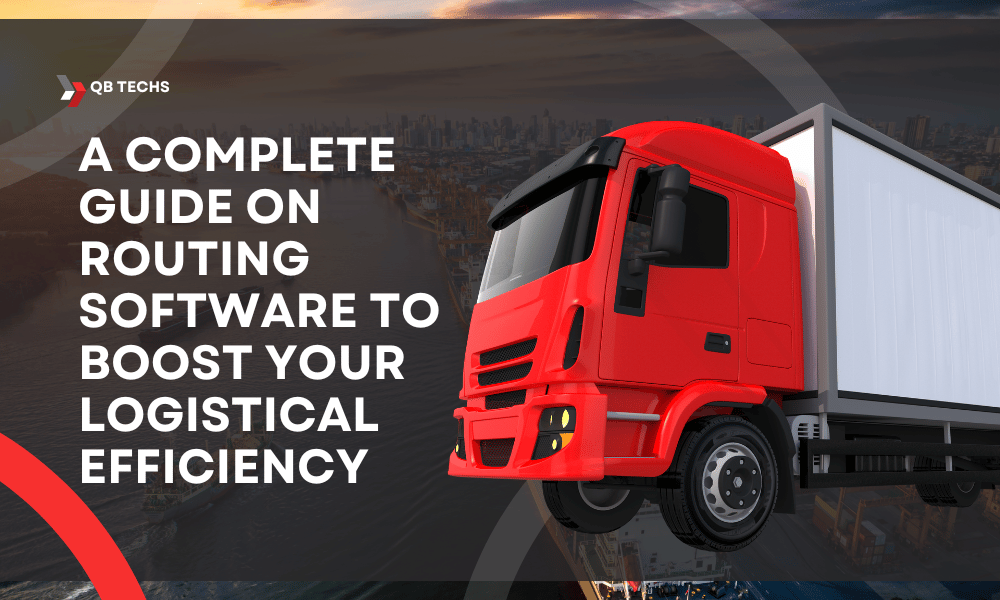From reducing fuel costs and minimizing delivery times to improving customer satisfaction and enhancing overall efficiency, routing software offers multiple benefits. This powerful tool leverages advanced algorithms and real-time data to create the most efficient routes, ensuring that every delivery is optimized for time and cost.
Additionally, integrating routing software with Xero Cloud Accounting can further streamline operations. By synchronizing delivery data with Xero’s accounting features, businesses can automate expense tracking, reconcile transactions effortlessly, and gain deeper insights into financial performance. This integration not only enhances operational efficiency but also provides a comprehensive view of both logistics and financial metrics, empowering businesses to make data-driven decisions and improve their bottom line.
Unlike today’s manual practices, integrating logistics software can bring transformative benefits, enhancing both logistical efficiency and profitability.
Let’s together delve into the 10 essential benefits of routing software, illustrating how it can revolutionize your existing methods and provide your small business with a competitive edge.
What is a Routing Software?
Routing software is a technological solution designed to optimize the planning and management of delivery routes. It has intelligent routing algorithms and real-time data to determine the most efficient routes for deliveries, pickups, and service calls.
By considering factors such as traffic conditions, delivery windows, and vehicle capacity, logistics routing software like Upper, helps businesses save time, reduce costs, and improve service quality.
Key Features of Routing Software
Given here are some of the important features of routing software. These features are the actuarial lifeblood of your logistics operations, enabling your business to achieve new levels of efficiency and effectiveness:
- Automated route planning: Calculates the most efficient routes automatically, reducing manual planning time.
- Real-time traffic updates: Provides live traffic data to avoid congestion and delays.
- Real-time tracking: Monitors vehicle locations and routes in real-time via GPS.
- Dynamic route optimization: Continuously adjusts routes based on real-time conditions and changes.
- Delivery schedule: Schedules deliveries with precise time windows for optimal customer satisfaction.
- Proof of delivery: Captures electronic signatures, photos, and timestamps to verify completed deliveries.
- Integration capabilities: Integrates seamlessly with other business systems for unified operations.
- Data analytics and reporting: Provides detailed reports and analytics to inform decisions and improve performance.
- Customer notifications: Sends automated delivery status updates to customers for enhanced transparency.
What are the Common Pitfalls Businesses Face When They Don’t Use Route Optimization?
-
Inefficient routes:
Manually planned complicated and time-consuming routes waste both time and fuel. This leads to increased operational costs and reduced productivity.
-
Delayed deliveries:
Inefficient or ineffective routing often causes deliveries to be late, which negatively impacts customer satisfaction and can lead to lost business.
-
Customer dissatisfaction:
Customers are always eager about the things they have ordered. Unnecessary delays, and slow or delayed deliveries result in unhappy customers, significantly damaging the company’s reputation and leading to customer churn.
-
Higher vehicle maintenance costs:
Wrongly planned routes lead to more wear and tear on vehicles, increasing maintenance and repair expenses.
-
Inability to meet increasing customer demands:
Modern customers expect accurate ETAs, short delivery times, and real-time tracking – all of which are difficult to provide without route optimization.
-
Limited real-time reporting and visibility:
Without route optimization software, businesses cannot provide up-to-date information on delivery status and make data-driven decisions.
These challenges highlight the importance of implementing route optimization solutions to improve operational efficiency, reduce costs, and enhance customer satisfaction in logistics and delivery operations.
Top 10 Benefits of Routing Software
From operations to opportunities, the integration of routing software can bring about significant improvements. For instance: It automates route planning, reduces manual errors, and provides real-time tracking and updates. This transformation leads to enhanced efficiency, better resource management, and ultimately, higher customer satisfaction.
Let’s see some of the significant perks of how integrating routing software can turn out to be lucrative for you:
-
Improved efficiency and productivity:
Routing software automates the complex task of route planning, allowing your team to focus on other critical tasks. This leads to increased productivity and more efficient use of time and resources.
-
Cost savings:
By optimizing routes, routing software reduces fuel consumption and vehicle wear and tear. This results in significant savings on fuel expenses and maintenance costs, directly impacting your bottom line.
-
Enhanced customer satisfaction:
Accurate and timely deliveries are crucial for maintaining high customer satisfaction. Routing software ensures that deliveries are made on time by selecting the fastest and most efficient routes, leading to happier customers and repeat business.
-
Real-time tracking and updates:
Many routing software solutions offer real-time tracking features, allowing businesses to monitor their fleet’s progress. This transparency helps in providing accurate delivery estimates to customers and addressing any issues promptly.
-
Scalability:
As your business grows, managing an increasing number of deliveries can become challenging. Routing software can scale with your business, handling more routes and vehicles without compromising efficiency.
-
Reduced administrative burden:
Automating route planning reduces the administrative burden on your staff. This frees up time for your team to focus on other important aspects of the business, such as customer service and strategic planning.
-
Improved driver performance:
With optimized routes, drivers spend less time navigating and more time making deliveries. This not only improves their productivity but also reduces stress and fatigue, leading to better overall performance.
-
Enhanced data and analytics:
Routing software provides valuable data and analytics on delivery performance, driver behavior, and route efficiency. These insights can help businesses make informed decisions and continually improve their operations.
-
Environmental benefits:
By optimizing routes and reducing fuel consumption, routing software helps lower the carbon footprint of your delivery operations. This eco-friendly approach can enhance your business’s reputation and appeal to environmentally conscious customers.
-
Competitive advantage:
Integrating routing software gives your business a competitive edge by improving efficiency, reducing costs, and enhancing customer satisfaction. Staying ahead of competitors is crucial for long-term success in any industry.
By integrating routing software, your business can enjoy these substantial benefits, making your logistics operations more efficient, cost-effective, and customer-centric.
Frequently Asked Questions
-
Can routing software adapt to last-minute changes in delivery schedules?
Yes, most routing software solutions are designed to handle dynamic changes in real time, allowing businesses to quickly adapt to new orders, traffic conditions, and other unexpected factors without disrupting overall efficiency.
-
How does routing software help in reducing the environmental impact of delivery operations?
By optimizing routes to minimize travel distance and time, routing software reduces fuel consumption and vehicle emissions, helping businesses lower their carbon footprint and contribute to environmental sustainability.
-
What kind of data insights can businesses gain from using routing software?
Routing software provides detailed analytics on delivery performance, driver behavior, route efficiency, and resource utilization. These insights enable businesses to make data-driven decisions, improve operational processes, and enhance overall performance.
Conclusion
Integrating routing software into your logistics operations can transform your business by automating route planning, reducing manual errors, and providing real-time tracking and updates. This leads to enhanced efficiency, better resource management, and higher customer satisfaction.
By understanding the significant benefits and avoiding common pitfalls, businesses can leverage routing software to achieve greater operational excellence and stay competitive in today’s market. Embracing this technology is not just a step forward—it’s a leap towards a more efficient and profitable future.




Leave A Comment
You must be logged in to post a comment.